U of T Law brings home numerous wins and prizes this competition season
Mooting is a time-honoured activity across law schools. This year, mooting participants at U of T Law had the unique opportunity to participate in competitive oral advocacy virtually. Due to the pandemic, all moots for the 2021 season occurred over Zoom. Overall, U of T Law did exceptionally well at the competitive moots, bringing home many wins and prizes.
The Moot Court Committee (MCC) also applauded the teams:
The Moot Court Committee would like to congratulate everyone who participated in competitive mooting this year. It was a particularly tough year given the ongoing pandemic and the virtual format of the moots, and we wish to acknowledge the extraordinary resilience exhibited by the U of T teams. We hope you are all as excited as we are about your incredible results at the various moot competitions. We would also like to thank all of the coaches for their hard work and support throughout this mooting season.
Adam F. Fanaki Competition Law Moot
Team members: Leah Kelley (2L), Sofia Sugamar (2L), Daniel Gao (3L), Mackenzie Cumberland (2L)
Coaches: Michael Laskey (Stikeman Elliott LLP), Nathaniel Read-Ellis (Adair, Goldblatt, Bieber LLP), Justin Mayne (3L), Jacob Webster (3L)
This year’s problem involved interpreting the standard for whether a transaction is likely to substantially prevent competition regarding acquisitions in the highly dynamic technology industry or in light of the uncertainty caused by the global pandemic.
Gao and Cumberland won the Runner-up Best Factum – Respondent Award
Cassels Brock Cup (Baby Gale) Moot
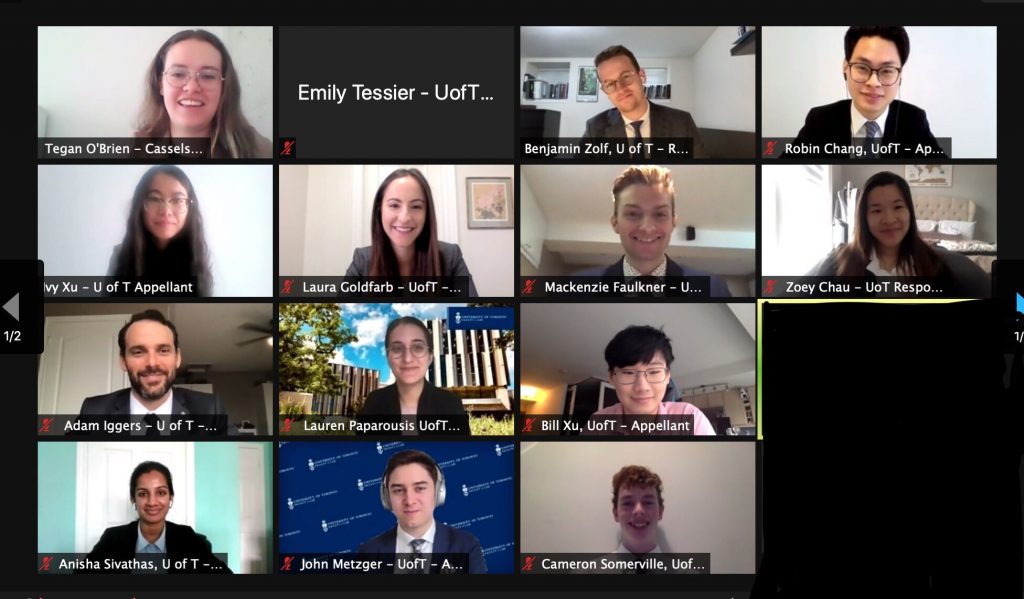
Team members: Robin Chang, Zoey Chau, Mackenzie Faulkner, Laura Goldfarb, Adam Iggers, John Metzeger, Lauren Paparousis, Anisha Sivathas, Cameron Somerville, Bill Xu, Ivy Xu, Benjamin Zolf (1Ls)
Coaches: Ema Ibraković (2L), Emily Tessier (2L), Sophie Zhao (2L), Militza Boljevic (2L)
Every year, the Baby Gale participants moot the same problem as the Gale Cup Mooters. The Gale problem is described below.
The U of T Law team won the Cassels Brock Cup. Chang and Ivy Xu won the prize for Top Appellant Team, and won the top and third best oralist, respectively. Goldfarb and Zolf won the prize for Top Respondent Team.
Donald G. H. Bowman National Tax Moot
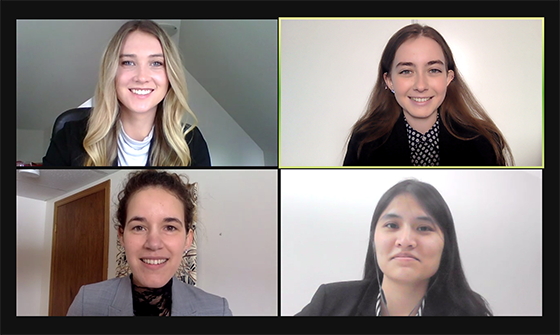
Team members: Hannah Bourgeois (2L), Caroline Harrell (3L), Thien Hoang (2L), Lynne Westerhof (3L)
Coaches: Professor Benjamin Alarie, Andrew Boyd (Osler, Hoskin & Harcourt LLP), Martha MacDonald (Torys LPP), Jae Won Hur (3L), Paul Hildebrandt (3L)
This year, Bowman’s mooters were tasked with appealing MacDonald v Canada (2020 SCC 6) to the Bowman Moot Court for Tax Appeals. They were asked to consider the proper test to apply in determining whether a taxpayer’s derivative contract is a hedge or speculation and determining if, on the facts, cash payment settlements made by the accused properly characterized as income losses or capital losses.
Both the appellant team (Bourgeois and Harrell) and respondent team (Hoang and Westerhof) made it to the semi-finals this year, finishing with second place appellant and second place respondent.
Frank W. Callaghan Memorial Moot
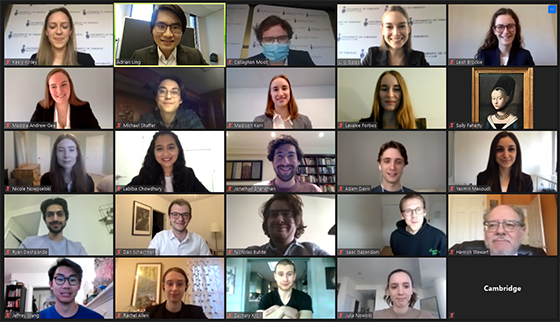
Team members: Dan Schechner (2L), Nicole Nowoselski (2L), Julia Nowicki (2L), Michael Shaffer (2L), Lavalee Forbes (2L), Nicholas Buhite (2L), Adam Davis (2L), Madeleine Andrew-Gee (2L), Ryan Shah (2L), Ellen An (2L), William Hall (2L), Colin Hunt (2L), Jamie Corbett (2L), Rachel Allen (2L), Yasmin Masoudi (2L), Madison Kerr (2L)
Coaches: Isaac Gazendam (3L), Ryan Deshpande (3L), Jeffrey Wang (3L), Zac Kroll (3L), Genevieve Madill (3L), Scott Wodhams (3L), Leah Brockie (3L), Emily Baron (3L)
The problem was based on the recent Ontario Court of Appeal case R v Sullivan, which involved reviewing the constitutionality of a Criminal Code provision that allows for a guilty verdict even if the accused were intoxicated to the point of automatism.
The Callaghan Memorial Moot is an internal U of T Law moot. Andrew-Gee and Shah placed first overall and won Best Appellant. Andrew-Gee also won First Oralist. Forbes and Kerr won Best Respondent and Top Respondent Factum. Forbes and Noweselski won Second Oralists. Shaffer won Third Oralist.
The Gale Cup Moot
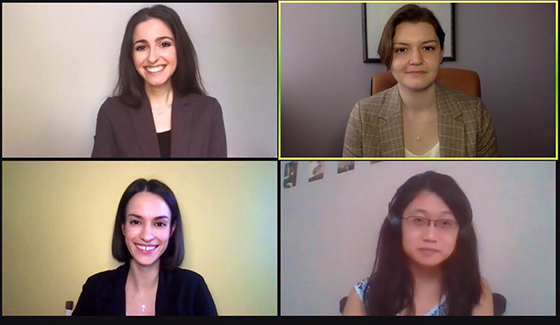
Team members: Emily Tessier, Ema Ibrakovic, Militza Boljevic, Sophie Zhao (2Ls)
Coaches: Paul-Erik Veel (Lenczner Slaght), Sinziana Hennig (Stikeman Elliott), Saambavi Mano (3L), Teodora Pasca (3L), Olivia Eng (3L), William Mazurek (3L)
The Gale Cup always centers around a criminal law appeal. This year concerned R v Ahmad/Williams, and concerned entrapment.
The U of T Law Appellant Team (Tessier and Ibrakovic) won the third Best Factum.
Harold G. Fox Intellectual Property Moot
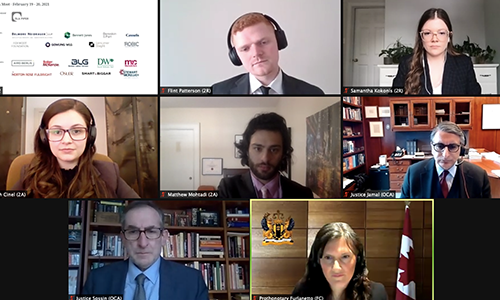
Team members: Hannah Cinel (2L), Matthew Mohtadi (3L), Sam Kokonis (2L), Flint Patterson (2L)
Coaches: Andy Shaughnessy (Torys LLP), Dominique Hussey (Bennett Jones), Sara Bolourchian (3L), Samantha Hargreaves (3L), Paul Jeronimo (3L), Amanda Wolczanski (3L)
The mooters analyzed a case appealed to the Supreme Moot Court for Intellectual Property Appeals. The problem involved the trademark registration of companies relating to vaccination.
For the second consecutive year, U of T Law won the moot, with Kokonis and Patterson taking home the Fox Cup for the Best Mooting Team. Cinel and Mohtadi were recognized as runners-up for the Gordon F. Henderson Award for the best factum writers (appellant team). Cinel was also named a runner-up for Best Oralist and the winner of the DLA Piper LLP Award for Mooting Excellence. Cinel and a teammate will be invited to represent U of T Law at the 2022 Oxford International IP Moot in England.
Julius Alexander Isaac Diversity Moot
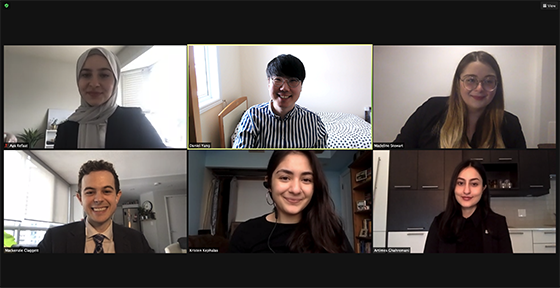
Team members: Madeline Stewart (3L), Aya Refaat (2L), Artimes Ghahremani (3L), Mackenzie Claggett (3L)
Coaches: Joseph Cheng (Department of Justice), Emily Lam (Kastner Lam LLP), Daniel Yang (3L), Kristen Kephalas (3L)
The problem concerned an appeal from the SCC to the fictional Diversity High Court of Canada for a fictitious decision, Williams v Canada (Minister of Health). This decision concerned the failure to collect race-based health information relating to the COVID-19 pandemic, and whether that failure unjustifiably infringes either Sections 7 or 15 of the Charter.
U of T Law took home the prize for Best Factum.
The Laskin Moot
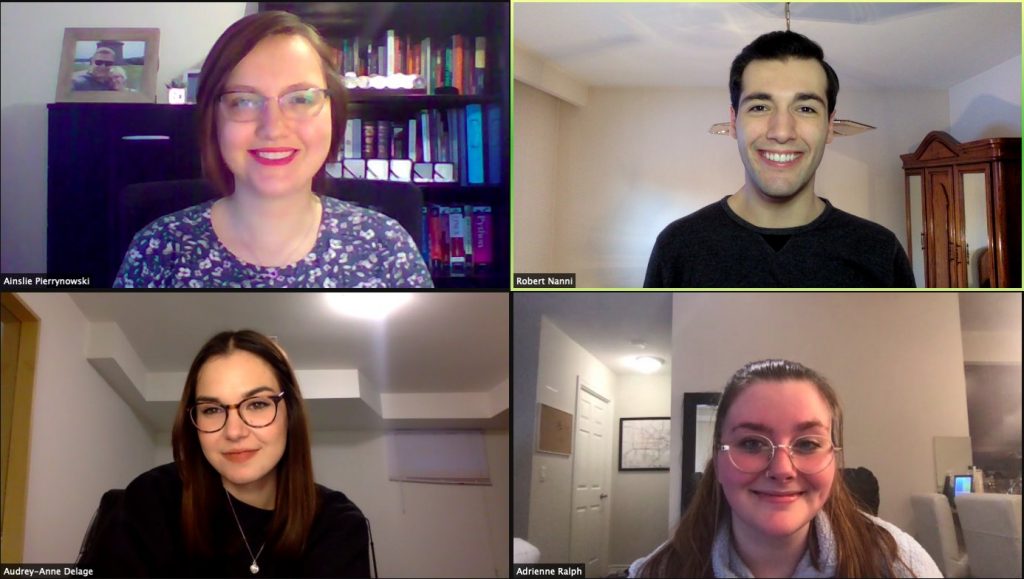
Team members: Robert Nanni (4L JD/MBA), Adrienne Ralph (2L), Audrey-Anne Delage (2L), Ainslie Pierrynowski (2L)
Coaches: William MacLarkey (MAG Crown Law Office – Civil), Padraic Ryan (MAG Constitutional Law Branch), Hannah Goddard-Rebstein (3L), Lauren Scott (3L), Katelyn Johnstone (3L)
The mooters tackled an appeal on the fictional Drouin v National Pandemic Action Response Committee. The problem tasked mooters to decide if the federal governments’ pandemic responses, specifically mandatory vaccination, was ultra vires its jurisdiction under the Constitution.
Mathew, Dinsdale & Clark Canadian Labour Arbitration Competition
Team members: Olivier Bishop-Mercier (2L), Braxton Murphy (2L)
Coaches: Kathryn Bird (Hicks Morley Hamilton Stewart Storie LLP), Amanda-Lawrence Patel (Hicks Morley Hamilton Stewart Storie LLP), Lauren Pearce (Paliare Roland Rosenberg Rothstein LLP), Stephen Shore (Ogletree, Deakins, Nash, Smoak & Stewart, P.C.), Samantha Nault (3L), Luka Ryder-Bunting (3L)
The problem dealt with workplace safety and potentially discriminatory treatment of employees in the context of the COVID-19 pandemic.
Phillip C. Jessup International Law Moot
Team members: Abrahim Ahmed (2L), Molly Campbell (2L), Natasha Williams (2L), Ava Armand (3L)
Coaches: Spencer Nestico-Semianiw (3L), Hana Awwad (3L), Alex Smith (3L), Emily Tsui (4L JD/MGA)
The case concerned international law responses to the fictional J-VID-18 global pandemic which imposed travel restrictions, the diplomatic asylum of a whistleblower, and the prohibition on the use of force as it relates to the shoot-down of a domestic flight.
U of T Law won second runner up in the Canadian National Rounds. The team is one of nine Canadian teams that moved onto the global White & Case Advanced Rounds where they are currently competing against over 160 teams representing 60 different countries.
The Walsh Family Law Moot
Team members: Florian Nagy (2L), Hannah Lank (2L), Venessa Sectakof (3L), Raoof Zamanifar (3L)
Coaches: Martha McCarthy (Martha McCarthy & Company LLP), Shannon Beddoe (Martha McCarthy & Company LLP), Richard Glennie (Martha McCarthy & Company LLP), Ryan Chan (3L), Hanna Yakymova (3L)
The problem asked whether an unmarried couple could be considered spouses for the purposes of the Family Law Act. They never moved in together, but lived together on two occasions, took vacations together, and were spouse-like in many other ways.
U of T Law swept the competition, winning Best Appellant Factum (Sectakof and Zamanifar), Best and Runner Up Oralists (Nagy and Lank, respectively), and Best Overall Team.
The Warren K. Winkler Class Actions Moot
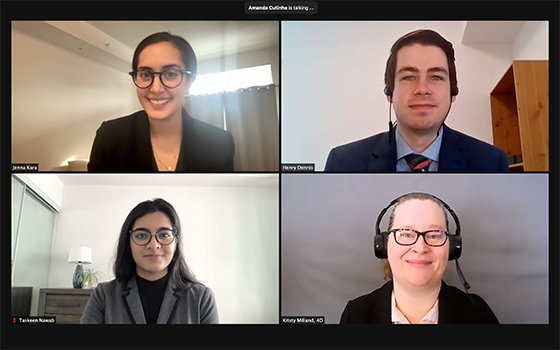
Team members: Henry Dennis (2L), Jenna Kara (3L), Kristy Milland (3L), Taskeen Nawab (2L)
Coaches: Cheryl Woodin (Bennett Jones), Amanda Cutinha (3L), Sherry-Maria Ghaly (3L), Renuka Koilpillai (3L), Tabir Malik (3L)
The problem this year concerned a product liability claim commenced by consumers of different drugs produced by different pharmaceutical companies to treat the same disease. The proposed consumer class claimed that the drugs caused undisclosed side-effects and brought a cause of action for negligence.
For the second consecutive year, U of T Law won the Winkler Cup, with the Plaintiff team (Kara and Nawab) winning overall. The Defendant Team (Dennis and Milland) won Best Defendant Factum. Nawab and Milland also won the prizes for second and third best oralists, respectively.
The Wilson Moot
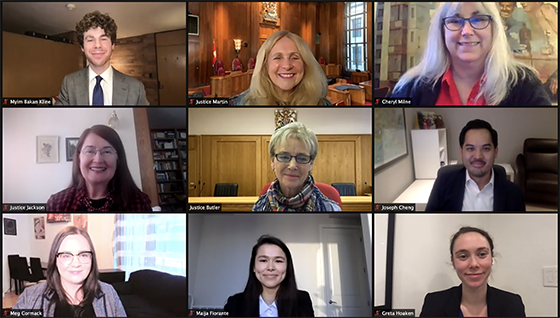
Team members: Myim Bakan Kline (2L), Meg Cormack (3L), Maija Fiorante (2L), Greta Hoaken (2L)
Coaches: Cheryl Milne (David Asper Centre for Constitutional Rights), Joseph Cheng (Department of Justice), Geri Angelova (3L), Ahmed Elahi (3L), Zoë Sebastien (3L)
The moot is an appeal of R v Chaudhry to The High Court of the Dominion of Canada. The accused was charged under section 145(5) of the Criminal Code for failing, without lawful excuse, to comply with a condition of a release order. The accused sought to challenge the constitutionality of the conditions of his release, on the basis of section 15 and 11(e) Charter infringements.
For the second consecutive year, the U of T Law won the Wilson Moot. The team also placed second for Best Factum.
The law school’s mooting program exists to offer students an opportunity to practice and improve their oral advocacy skills. All students are required to participate in a moot court competition during their second or third year of law school. Students may fulfill this requirement in a competitive moot, or take the Upper Year Moot class.
Tryouts for most competitive moots occur in the fall and are run by the MCC.
Editor’s Note: This article only includes competitive moots that are overseen by the MCC. This does not include the Arnup Cup/Sopinka Cup or the Kawaskimhon Moot. We extend congratulations to the U of T Law team for placing third at the Arnup Cup and to the U of T Law participants of the Kawaskimhon Moot, a non-adversarial, non-competitive moot.





